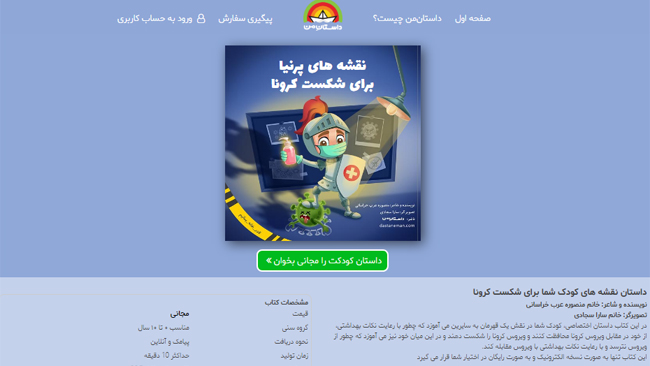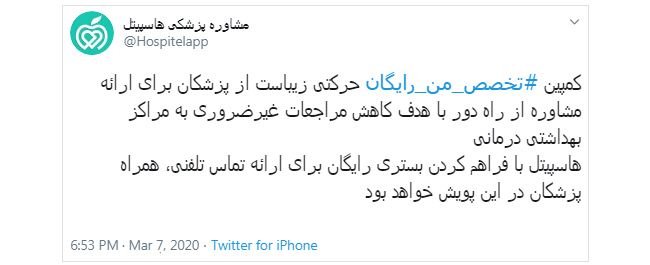As COVID-19 has brought much of traditional life around the world to a standstill, solidarity and mutually shared responsibility have proved critical to help the public cope with the crisis in the interim and mitigate the dire effects of the pandemic.
In Iran startup teams responded to the crisis with a maximum degree of creativity and resilience at an astonishing pace.
With schools and kindergartens closed since early March and many children confined to their homes, for many families the lack of physical space and the growing emotional and economic pressure turns the household environment into a disturbing space for children’s daily life. That’s why Dastaneman startup which specializes in publication and distribution of personalized online children’s story books embarked on a new project to prepare and release another unique book for kids (between the age of 3 to 8) in the shortest possible time, to educate them about coronavirus and personal hygiene using poems and illustrations.
“We intended to help parents and their children reduce their stress and anxiety and make the mundane issue of observing hygiene practices fun for kids,” Pantea Didari the co-founder of Dastaneman said.
She added "We made the book available online for free and since April 11, when we launched the book, it has been downloaded over 200,000 times, and in the field of children’s books in Iran I think this is a significant achievement.”

A screenshot from Dastaneman website shows an electronic book which could be personalized with kid's name. The book educates children about coronavirus.
The coronavirus outbreak in Iran since February has plunged the country into a big crisis, putting unprecedented strain on its already fragile and heavily-sanctioned economy. The declines have been especially sharp for startups in hard-hit sectors, such as retail, travel and hospitality.
Some startups have taken precautionary cuts as the fog over the economy makes it hard to predict the future. But even before the coronavirus outbreak, Iran’s startups had had a rough time coping with the pressure from the unilateral US sanctions.
Moreover, for most startups that normally were counting on the traditional sales boost ahead of Nowruz (Persian New Year), the outbreak in February and March, one of the most important funding periods of the year, forced them to freeze activity.
Although, the knock-on effects from the crisis have been huge, startups in areas such as telehealth, disease diagnosis and virtual learning have risen to the challenge, offering services for free to help contain the outbreak.
Golrokh Davaran is a medical doctor and founder of popular Hospitel app, which is one of the first applications in E-health domain in Iran. She quit her residency course of gynecology at one of Tehran’s prestigious universities only to pursue her dreams and launch her own startup later.
“Before the coronavirus outbreak, the concept of E-health, unlike food delivery, online taxi and other similar services was not well-established among the public,” Davaran said.
“However, since the early days of the virus outbreak, demands for our services grew far beyond our expectations, considering the small size of our business,” she said.
Hospitel led a benevolent nationwide popular campaign organized by medical professionals called تخصص_من_رایگان# (my expertise for free) as part of efforts to allow people have access to medical services for free from home by audio or video, without the need to go to medical centers in order to reduce infection risk and prevent hospitals from being overwhelmed during the ongoing crisis.
"Since early March to April 20 there has been over 20,000 minutes of call time using our application to ask questions and consult with our doctors about corona-related issues and other medical emergencies," Davaran said adding that health care startups like hers have seen a boost in business.
"Given the fact that this crisis is very unlikely to go away soon, we are working to expand our services," she said.

Hospitel, an e-health mobile application, announced on Twitter that it would join تخصص_من_رایگان# (my expertise for free) campaign by providing free medical consultations with doctors about corona-related issues.
Another commendable example for the efforts of fast-acting, socially conscious startups is Paziresh24 that provides online appointment booking system for doctors and hospitals across Iran since 2015. The coronavirus outbreak forced them to halt their services because of mass cancellation and postponement of non-urgent medical visits. Yet, Abolfazl Sajedi the managing director of Paziresh24 in the desert city of Yazd says "Despite those challenges, we decided to push forward the launch of our new platform that was originally planned for 2021, to allow people across Iran to get round the clock charge-free medical advice and communicate with over 400 healthcare professionals across the country."
Sajedi remains optimistic about the future and to ensure the smooth operation of the new platform, he has even employed new personnel.
Among a myriad of other startup projects in response to COVID-19, one could refer to companies that offer services to help students separated from their classrooms while universities and schools remain closed.
Lahzenegar, a popular live stream marketplace for live events and online classes has offered free services to educational institutes and schools. Amir Hossein Faghihi, the managing director of the company, declined to talk specifically about financial issues and their customers, but said that they have recorded a 50% increase in number of our online events and classes compared to the same period last year.
Cloud service provider, Arvan Cloud that is one of the leading tech companies in Iran, also offered free of charge services including video platforms, live streaming and content distribution network (CDN) for two months to websites that have been active in battling COVID-19. It also provided free services to educational institutes, universities and schools during the period. The company has put the value of those services at around $6,000.
Meanwhile, the extent of the health emergency and the fact that this virus is not expected to disappear any time soon have made startup accelerator and investment companies in Iran shift their focus to meet the needs created by this new environment.
In this regard, a manager at a leading Iranian startup accelerator, speaking not for attribution, said "We have changed our plans and strategies for the next six months at least, turning our focus and resources on initiatives and ideas that could promote health care and facilitate social distancing measures."
"We now seek to support ideas relevant to prevention, treatment and easing the negative effects of the crisis. For example we have examined ideas presented to us for production of technology-based equipment and systems from ventilators to new disinfectant machines to reduce people's exposure to sanitizers that could be harmful to hands and lungs."
It is true that the COVID-19 crisis has hurt many businesses and presented startups with greater challenges, but at the same time this crisis could be a catalyst for entrepreneurship and startups now have to dig deep and get creative to survive.
In that vein Sajedi from Paziresh24 said “The past two months provided us with the opportunity to seriously review and examine our activities and identify our weaknesses in order to improve and modify the relevant processes for the future.
Mohammad Hashemi is a journalist and analyst of Iranian affairs based in Tehran. Follow him on Twitter at @mo_hashemi.